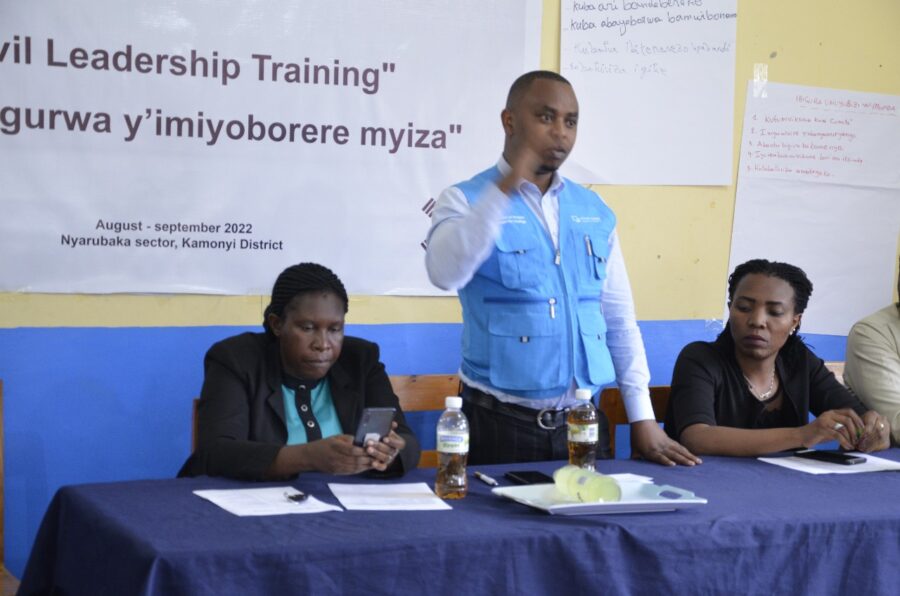How Global Civic Sharing has transformed the lives of Kamonyi residents

Through Civil leadership Training (CLT), the residents of Kamonyi District have had their lives transformed for the better as a result of help from Global Civic Sharing.
This international development NGO committed to promoting sustainable development through assisting the poor in developing nations and civil society empowerment.
The civil leadership training is a capacity building program under self-reliance Project for vulnerable people based on civil empowerment in Rwanda funded by Korea International Cooperation Agency (KOICA). Throughout this project, whose inception is from 2015, Global Civil Sharing has educated citizens of Nyarubaka Sector about self-reliance mechanisms as one of its components aimed at promoting sustainable community development in eight countries by encouraging poor and vulnerable people in self-reliance activities.
This year, CLT was organized from 31 August to 07 September 2022 and was attended by 90 Self Help Groups (SHG) Representatives from 40 Groups and 5 SHG Facilitators and focused on Community decision-making methodology (governance), Community resilience and problem-solving methodology, Conflict resolution methodology and Community response system for various disaster situations such as infectious diseases among others.

Group members during the training with Claudine Mukamahoro (trainer)Kamonyi residents said that they have recorded success by joining the savings and loan groups, which have already transformed their lives.
In the Nyarubaka sector, more than 1,300 residents gathered in 40 savings and loan groups with the support of Global Civil Sharing.
The group members meet twice a week to contribute their savings, from which a member can borrow to start or run income-generating activities and solve different problems they have in their families.
Francine Nambajimana, 37 years old, testified that joining these saving and loan groups enabled her to borrow money from the group and buy a pig. The pig rearing, after thriving, enabled her to buy a cow which has already reproduced.
“We could not afford milk, but now we are safe and nutritious food secure as we get milk from our own cow without buying it from elsewhere. Affordingsuch ah need is a result of what we have done thanks to Global Civil Sharing,” she said.
Chantal Bizimutima, who lives in Buhunga village in Ruyanza, said that she joined the Duteraninkunga saving group when Global Civil Sharing visited and urged them to join the group.
Dancing mood during the training
Prior to that, she had no knowledge about how such groups could transform the lives of vulnerable people. In 2017, they formed a group of 29 people (including Chantal), in which each member would save Rwf200 per week.
She said each member of the group was eligible for five shares.
“Therefore, every week I can save Rwf1,000 plus Rwf200 saved for direct support,” she narrated.
She said that she has already benefited from joining the group.
“I managed to sell five piglets and sold each at Rwf24, 000. Now I am rearing goats. I can afford basic needs in the family. The support is eradicating poverty in our communities,” she said.

Edouard Bizimungu, the vice-president of the Duteraninkunga Group, explained that the benefits of joining saving groups include learning how to help one another.
He said that when the group members meet to gather savings, they also save money that can help a colleague who might face a certain issue or when a member has a party.
“Most of the members have bought cows, goats, chickens, pigs and others have renovated their houses and their lives have changed,” he noted.
Aimable Twagirayezu, Global Civil Sharing Country Representative said that as an international NGO with a mission to promote sustainable development and the self-reliance of communities through capacity building of residents in developing countries, they are helping those residents to change their mindsets.
“We are changing their attitudes so that they join the savings and credit groups, and their lives will be changed by saving and borrowing from the groups to develop themselves and change their lives,”
he said.

In collaboration with SACCO, Global Civil Sharing assists these citizens to obtain loans so that those belonging to the group receive loans that are more than Rwf1 million per group.
Farm and livestock groups are trained in agricultural improvement and also receive agro-inputs.
The impact of Global Civic Sharing was admired by the Executive Secretary of Nyarubaka Sector, Mbonigaba MPOZENZI Providence.

She said that the citizens have changed their attitude by being among the first to pay for their own health insurance and participating in other life-changing programs.
She said: “It’s clear that the residents have changed their attitudes. This is a good outcome thanks to Global Civil Sharing, and they will help change new ones. They are now extremely important for citizen development.”
The savings and loan groups known as Self Help Groups (SHGs) were established in 2015 in collaboration with Global Civic Sharing.

Apart from these groups, the citizens in this area of Nyarubaka have received assistance in many ways, including agricultural inputs, adult literacy and they will also be given a small cassava processing plant.

Global Civic Sharing (GCS) provides development aid to needy communities in different countries.
This NGO was founded in 1998 and has its headquarters in South Korea. It works in Vietnam, East Timor, Mongolia, Rwanda, Ethiopia, Myanmar, and Kenya.
It declares its objectives to be to carry out development assistance projects, support civil-society empowerment, provide emergency relief assistance, support the victims of natural disasters and conflicts, and encourage participation in the global exchange movement.
By Deus Ntakirutimana
![]()


